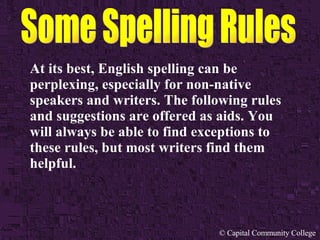More Related Content
Similar to sshshs bhshsh (20)
sshshs bhshsh
- 1. © Capital Community College
At its best, English spelling can be
perplexing, especially for non-native
speakers and writers. The following rules
and suggestions are offered as aids. You
will always be able to find exceptions to
these rules, but most writers find them
helpful.
- 2. © Capital Community College
ibefore e, except after c. . . .
achieve, believe, bier, brief, hygiene, grief, thief, friend, grieve, chief,
fiend, patience, pierce, priest
ceiling, conceive, deceive, perceive, receipt,
receive, deceit, conceit
. . . and in words that rhyme with hay. . .
neighbor, freight, beige, sleigh, weight, vein, and weigh
. . . and some other exceptions. . . .
either, neither, feint, foreign, forfeit, height, leisure,
weird, seize
- 3. © Capital Community College
A final ychanges to iwhen an ending is added .
supply becomes supplies
worry becomes worried
merry becomes merrier
. . . except when that ending is -ing. . .
crying, studying
. . . And when the y is preceded by a vowel. . . .
obeyed, saying
- 4. © Capital Community College
A silent eis dropped when adding an ending that
begins with a vowel . . .
advance + -ing = advancing
surprise + -ing = surprising
. . . but kept when the ending begins with a consonant . . .
advancement, likeness
. . . unless the e is preceded by a vowel. . . .
argue + -ment = argument
true + -ly= truly
- 5. © Capital Community College
Adding a prefix seldom changes the
spelling of a word.
misspelled
unnecessary
dissatisfied
disinterested
misinform
- 6. © Capital Community College
We form plurals in English by adding
-s or -es. shoes
porches
boxes
bushes
blitzes
For words ending in a consonant plus -y, change the -y to -i
and add -es. For proper nouns, keep the -y.
toys
companies
Kennedys
- 7. © Capital Community College
When adding an ending to a word that
ends in a consonant, we double that
consonant when the ending begins with a
vowel and the last syllable of the word is
accented and that syllable ends in a single
vowel followed by a single consonant.
Now that’s a mouthful! Let’s look at
some examples. . . .
- 8. © Capital Community College
ADMIT + -ed = ADMITTED
When adding an ending to a word that ends in a consonant,
we double that consonant when the ending begins with a
vowel and the last syllable of the word is accented and that
syllable ends in a single vowel followed by a single
consonant.
A D M IT is accented on the last syllable and the final
consonant is preceded by a vowel, so we double the t
before adding, for instance, an -ing or -ed : admitting,
admitted.
- 9. © Capital Community College
FLAP + -ed = FLAPPED
When adding an ending to a word that ends in a consonant,
we double that consonant when the ending begins with a
vowel and the last syllable of the word is accented and that
syllable ends in a single vowel followed by a single
consonant.
FLAP contains only one syllable, which means that syllable
has to be accented. The final consonant is preceded by a
vowel, so we double that final consonant: flapped, flapping.
- 10. © Capital Community College
COUNSEL + -ing = COUNSELING
When adding an ending to a word that ends in a consonant,
we double that consonant when the ending begins with a
vowel and the last syllable of the word is accented and that
syllable ends in a single vowel followed by a single
consonant.
COUNSEL contains two syllables and the final consonant is
preceded by a vowel, but the word is accented on the first
syllable, so we don’t double the consonant before adding
an ending.
- 11. © Capital Community College
BEGIN + -ing = BEGINNING
When adding an ending to a word that ends in a consonant,
we double that consonant when the ending begins with a
vowel and the last syllable of the word is accented and that
syllable ends in a single vowel followed by a single
consonant.
BEGIN contains two syllables and the final consonant is
preceded by a vowel, and the word is accented on the last
syllable, so we double the consonant before adding an
ending: beginner, beginning
- 12. © Capital Community College
DESPAIR + -ed = DESPAIRED
When adding an ending to a word that ends in a consonant,
we double that consonant when the ending begins with a
vowel and the last syllable of the word is accented and that
syllable ends in a single vowel followed by a single
consonant.
DESPAIR contains two syllables, and the final syllable is
accented, but the final consonant is preceded by two
vowels, not a single vowel, so we don’t double that final
consonant when we add an ending.
- 13. © Capital Community College
Becoming a better speller is a matter of personal
commitment and finding your own method to add this
important skill to your writing arsenal. Refer to the
Guide to Grammar and Writing for recommendations on
working on spelling. Also, take the spelling quizzes on the
List of Interactive Quizzes.
- 14. © Capital Community College
This PowerPoint presentation was created by
Charles Darling, PhD
Professor of English and Webmaster
Capital Community College
Hartford, Connecticut
copyright November 1999
